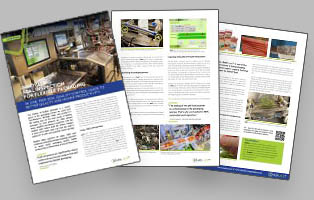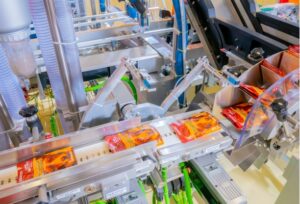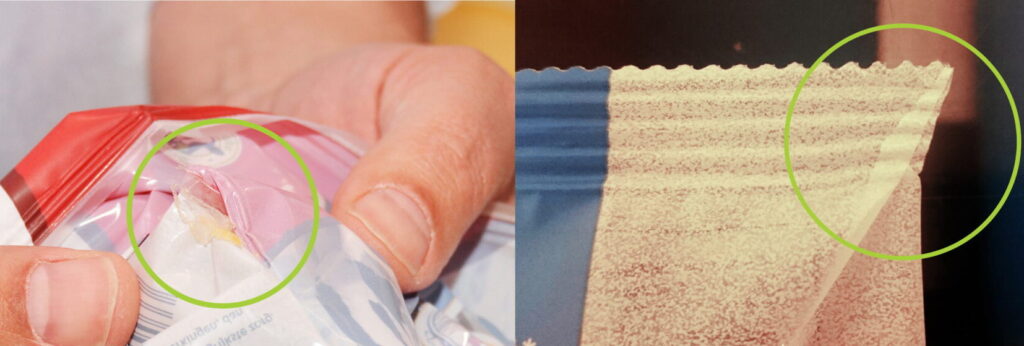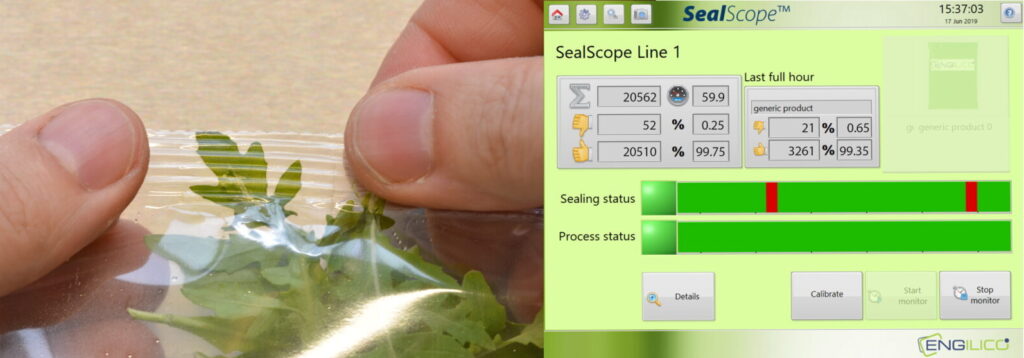
The sealing of flexible packages is a critical phase in the packaging process for many food manufacturers. Wrinkles, folds, and product in the sealing area are the main causes of leaking packages. As food products are often packed under modified atmosphere conditions, even the smallest leaks reduce shelf life, induce changes in taste, pose health risks, and may also lead to expensive re-calls with potential brand damage. Engilico offers solutions for inline, 100% seal inspection of flexible packages enabling customers to realize better packaging quality, higher productivity, and elimination of manual inspection.
DOWNLOAD PDF
Food production is a huge market with millions of packages produced daily. Many seal inspection processes are still based on off-line and manual inspection, but with increasing quality demands and higher productivity requirements, these systems are no longer adequate. Better alternatives are in-line, non-destructive inspection technologies, but for flexible packaging these are challenging. For example, standard vision camera inspection systems have many limitations for flexible packaging due to often non-transparent films, reflections, and the deformation of the packages. But with the Engilico solution, this seal inspection for flexible packages such as pouches, flow-packs and pillow bags is efficiently possible.
In-line, 100% seal inspection
SealScope® offers a unique approach to in-line seal inspection. Sensors are installed on the sealing jaws of the packaging machine and measure the sealing behavior during the closing of the sealing jaws. Every time a package is sealed, the actual measurement is compared to a reference model of correctly sealed packages. In case the deviation is higher than a user defined limit – due to product in seal, or wrinkles or folds in the seals-, SealScope® will issue a rejection signal and the package is excluded via an ejecting system. This automated 100% inspection leads to immediate benefits: Every single package is inspected, so manual inspection can be eliminated. By rejecting the defective packages, the outgoing quality is instantly increasing, inducing less rework and lower scrap. Another advantage of SealScope® is that it is independent of packaging machine brand manufacturers. Worldwide Engilico has integrations on packaging machines from renown brands such as PACRAFT, (Toyo Jidoki), Leepack, ULMA, GEA, Omori, SN, MesPack, HDG, etc.
Optimizing the packaging process
The immediate role of SealScope® is detecting and rejecting residual packaging defects, thereby optimizing the outgoing packaging quality. The sensitivity of the rejection level can be set according to the customer’s quality policy to find the right balance between outgoing quality and rejected packages.
As every mechanical process will eventually experience drift, variations in productivity and packaging quality start to increase. Drift can be caused by e.g., dirt accumulation on the sealing jaws, wear on moving parts, etc.
SealScope® continuously monitors the sealing process, allowing the operators to take corrective actions – for instance preventive cleaning of the sealing station. As such, the SealScope® monitoring tool, allows to avoid further process drift and to keep the machine in optimal shape.
Further are typical customer cases on how seal inspection helped companies in pet food, cheese, meat and fresh produce packaging applications.
Inspecting seal quality of wet pet food pouches

Wet pet food is especially prone to sealing concerns. Because many sauces or gels are used in the recipes, it easily can stick in, or around the package’s sealing area during the filling process
Badly sealed pouches are a major concern during the sterilization process, as when the pet food is heated, it might leak and pollute the autoclave. The disruption to production and man-hours for au¬toclave cleaning has a domino effect in cost. Worse, if compromi¬sed packages are not detected they can lead to reduced shelf life, liability for health risks, and broad re-calls. “
Special Dog Company, a Brazilian pet food producer has opted for SealScope® on their Toyo Jidoki rotating pouch packaging line. The automated, 100% seal inspection leads to immediate benefits: Every single package is inspected, so manual inspection can be reduced or drastically reduced. By rejecting the defective packages, the outgoing quality is instantly increasing.
“The non-destructive seal testing made directly on the sealing bars greatly improved our effective line efficiency from previous manual inspection methods.” Octávio Sobéron explains, “Special Dog Company is delivering a 100% inspected product, which means satisfied consumers.”
Hazeleger Kaas packs sliced cheese with care
Sliced cheese is often horizontally flow wrapped under modified atmosphere. To avoid product in seal, the positioning of the trays, the stacking of cheese on these trays and the relative positioning within the packaging film is crucial. Wrinkles in the fold-over must also be avoided to warrant seal integrity, especially for gas flushed products like cheese.

Hazeleger Kaas, a Dutch cheese packager installed SealScope® to monitor the performance of its OMORI horizontal flow wrap machines. The first role of SealScope® is detecting and rejecting residual packaging defects, optimizing the outgoing packaging quality. Typical rejects include cheese trays partially stuck in the seal, product in seal or wrinkles. The sensitivity of the rejection level can be set according to the customer’s quality policy to find the right balance between outgoing quality, packaging speed and rejected packages.
The benefits of SealScope® at Hazeleger Kaas are measurable in both increased output through a higher first-time-right ratio and better package quality, creating a sustainable competitive advantage.
Producer of dried fruit relies on SealScope® to guarantee outgoing quality
Seeberger is the leading brand of premium nuts and dried fruit in Europe. These products require gas flushed packages to make sure that the product quality and flavor are preserved. To improve their packaging quality and productivity, Seeberger was facing challenges when filling and packaging dried fruit on a vertical bagger. Depending on the variety of the product, the moisture and the natural sugar content, the timing of the filling can vary significantly. This occasionally leads to product in seal. When this seal is then cut, the knife gets contaminated with the product. This causes both a quality and a productivity challenge since the bags with product in seal cannot be hermetically sealed and the machine needs to be stopped to clean the knife.
With SealScope®, it is now possible to detect both wrinkles and product in seal. In this case, the knife is deactivated which has two main advantages. Firstly, packages with contaminated seals can be rejected, – increasing outgoing product quality- and secondly, the machine can keep running, increasing line productivity. In addition, SealScope® enables to determine the optimal packaging speed to further maximize the line output.
Handl Tyrol chooses SealScope® for stricter quality control on sausage packaging
In order to control the quality of flowpacks with dry sausages, that were produced at ever higher output rates, Handl Tyrol searched for an in-line seal inspection system. Manual or visual inspection of the seal quality of flow packs were not feasible. And, traditional CO2 detectors used in the final packaging have important limitations as they slow down the process and only detect larger openings in packaging. For this reason, Handl Tyrol required a more effective and versatile solution. Handl Tyrol uses SealScope® to inspect flow-packs with sausages where folds or product in the sealing area can lead to leaking packages.

Today, six packaging lines are equipped with the SealScope® solution. Imperfect seals and large wrinkles are systematically identified; this has significantly improved the quality of the finished goods, leading in turn to greater customer satisfaction.
The introduction of the SealScope® system has also improved productivity levels. Thanks to the early warning system, simple preventive maintenance measures – e.g. cleaning the sealing jaws – are now performed much faster. The monitoring function ensures that the packaging process operates within the correct tolerances. As a result, Handl Tyrol gained more control over its packaging process; downtime is reduced, and capacities are optimized.
Fresh produce, a delicate product for seal inspection
Packaging fresh produce is typically done using vertical-form-fill-seal machines (VFFS) under modified atmosphere to preserve the freshness of the vegetables. Therefore, package integrity is important to warrant shelf life. A big challenge is the seal inspection of sliced vegetables, leafy greens or salads. Because these products are lightweight, they swirl during the filling and tend -as they are often wet- to stick to the inner bag sides. Also, as the filling is not 100% controlled, it often occurs that the seal bars are already closing when the last leaves are falling. Because the leaves are light, they are often completely crushed due to the pressure of the sealing.

So how is Engilico detecting small fresh produce particles in the sealing area? For these applications, Engilico uses highly sensitive sensors. These sensors are able detect the slightest deviations during the closing of the sealing bars. Every individual seal measurement is compared to a reference seal and when product is present in the seal, a deviation is detected, and the bag is rejected.
DOWNLOAD PDF